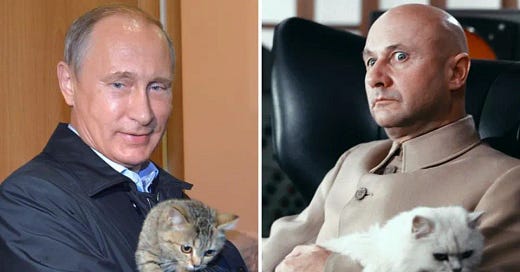Much ink has been spilled regarding Putin's motivation for the invasion of Ukraine. The true motivation, not the risible 'nazis in their government' fiction, nor the 'NATO expansion is a provocation' angle, and not even the 'common culture' bit.
Opinions in that regard (at least those not of the “he’s gone insane” variety) are coalescing around the notion that Putin considers the dissolution of the USSR one of the great tragedies of his country's history, and that his motivation is to "restore" (scare quotes meant to mock the notion of restoration itself) Russian hegemony over traditionally Russian lands.
There's a word for this: revanchism, and there are examples of it throughout history and across the world. The term emerged in the late 1800s in France, where nationalists wanted to 'reclaim' the Alsace-Lorraine lands lost in the Franco-Prussian war. China’s claim over Taiwan and other lands stands out as a modern example. The Israel-Palestine conflict is all about revanchism. American progressives routinely speak of "land stolen from the Native Americans," with concomitant talk of reparations. The cynic’s view: It’s about overlaying a moral veneer on the pursuit of land, power, and OPM.
Revanchism (see also: irredentism) often takes the form of war, usually because the side that won the last one won't just forego its victory. And, while Ukraine was not "lost" in any traditional sense, her liberation from the USSR's iron boot was a result of losing the Cold War.
Pride and ego, coupled with a Bond villain's sociopathy, appear to be what Putin is all about.
There is a principle in Sharia law, called Dar al-Islam, wherein once a territory has been "opened" to the light of Islam, it forever belongs to the House of Islam (Dar al-Islam). So it appears with Putin's view of Mother Russia and her satellites. He has puppet leadership in several former Soviet republics and constituent republics, has already snatched parts of those FSRs (e.g. Crimea from Ukraine, Abkhazia and South Ossetia from Georgia), has been rattling his saber against the Baltic states for years and Moldova more recently, and continues to posture that any formerly “Russian” land that joins NATO is committing an act of treachery.
Columnist Jonah Goldberg introduced me to the phrase "snapshot geography,” the notion that there is, historically, a ‘correct’ set of borders and dominion over lands, and that all that has happened thereafter (and, presumably, before) is illegitimate and therefore subject to revanchist correction. It’s a common attitude among people who feel entitled to decide who has the rights to certain tracts of land, no matter what the facts on the ground happen to be, and its’s not a modern idea.
Islamic extremists, not that long ago, inflamed their acolytes with grand visions of 'restoring' the Caliphate, which stretched from Spain to central Asia and from equatorial Africa to the Balkans. Putin, I figure, has onanistic dreams of the 'restoration' of the Soviet empire that stretched from East Germany to the Pacific, from Bulgaria to the Baltic Sea, and from Turkmenistan to the North Pole.
Delusional? Certainly, but that hasn’t stopped tyrants before. Nibble by nibble, abetted by Western energy fecklessness and European political timidity, he's made small inroads.
Ukraine was the big test. If he could 'take back' a nation whose 'departure' apparently rankled the Russians more than any other, then anything would appear possible. The Ukrainians, much to his consternation I'm sure, turned out to have different ideas, and the Europeans have been motivated (or shamed, you choose), to grow a pair and stand tall against the Bear.
I highly doubt Putin will simply shrug his shoulders, say "we tried," and find a face-saving exit strategy (such as recognition of the Crimean annexation and ceding of the Eastern separatist provinces). As with the Global Caliphate, this has a feel of jihad about it. Already, some speculate that the only way this ends is with Putin being removed from power.
Time will tell. The great tragedy, of course, is the wanton and utterly unnecessary infliction of mass death upon both the Ukrainians and the Russian army.






Outstandingly well said and reasoned, Peter! This adds in the vital element of international context as well, to paint a picture that looks a LOT like Ukraine-Russia in BOTH an international and chronological setting.
It's hard to know what's going on over there because of the general ineptitude of the media, but it's likely that we DO have a decent idea of what went on there in less recent history, and your explanation of things fits well in that sense. As any correct assessment of anything must.
I love the reference to "snapshot geography!" One thing about that, of course: the "snapshot" changes over time. Just a question of who's holding the camera, I guess. However it adds a cautionary note to the Fukuyama notion that history might have an endpoint.